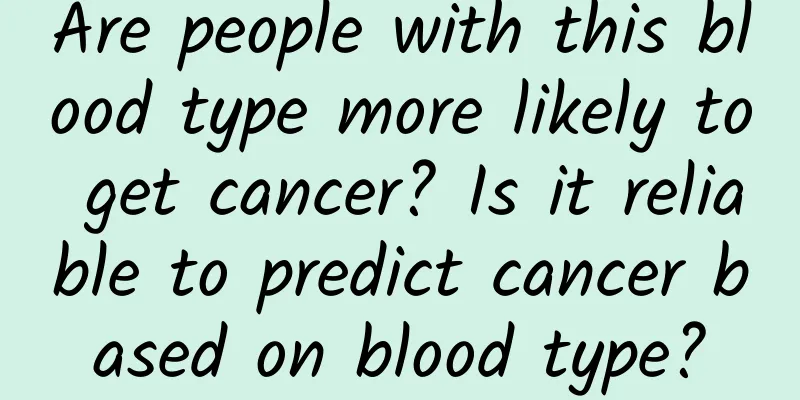Are people with this blood type more likely to get cancer? Is it reliable to predict cancer based on blood type?

|
People often ask: Is blood type related to cancer? Are people with certain blood types more likely to get cancer? The relationship between blood type and cancer has always been a topic of concern to many people, and it has also been controversial. As we all know, blood type is innate, determined by genes, and cannot be changed. Is getting cancer also destined and an unchangeable fate ? Of course it is not that simple. Is there any relationship between the occurrence of cancer and blood type? There are different types of blood types. The most common is the ABO blood type, including type A, type B, type AB, and type O; there is also the RH blood type, including RH positive blood and RH negative blood (extremely rare, called panda blood). Image source: unsplash.com To know whether the occurrence of cancer is related to blood type, we can first look at these studies: -In 1953, a British study found that type A blood was associated with the occurrence of gastric cancer. -In 2017, a study published in the journal PLoS One suggested that there is a relationship between different blood types and the occurrence of cancer. -A study in the United States found that ABO blood type is significantly correlated with the occurrence of pancreatic cancer, and people with type O blood are more likely to develop pancreatic cancer. The study believes that the DNA sequence variation at the ABO site on the genome is involved in determining the susceptibility of people with type O blood to pancreatic cancer. -A study suggests that people with AB blood type have a higher risk of liver cancer. -In 1964, The Lancet published a study by Norwegian scholars, which concluded that there was no obvious correlation between ABO blood type and cancer. -A large study covering the past 60 years in 30 countries, including 100,554 cancer patients and 30 cancer sites, showed the relationship between blood type and cancer risk. -A large study in China: A research team from Shanghai Jiao Tong University published a study on the relationship between different blood types and cancer in the journal Public Library of Science Comprehensive. The study recruited more than 18,000 volunteers and followed up these people for more than 20 years, revealing the relationship between blood type and tumors in Chinese people. A comprehensive analysis of the results of multiple studies revealed that there are actually inconsistent conclusions between different studies . There may be a certain correlation between blood type and the occurrence and prognosis of cancer, but further research is needed, especially the biological and molecular mechanisms involved are still under exploration. In summary: ① People with type A or AB blood who contain A antigen have a higher risk of cancer, while those without A or B antigens (i.e. type O blood) have a lower risk of cancer. Compared with type A blood, people with type B blood have a lower risk of cancer. ②ABO blood type antigens may be directly involved in the occurrence and metastasis of gastrointestinal tumors, and their expression on gastrointestinal cells may be highly correlated with cell proliferation and motility. ③ABO blood type is not associated with the risk of lung cancer, prostate cancer, skin cancer, bone cancer, and connective tissue tumors. In addition, ovarian cancer does not seem to be closely related to blood type, and A and B antigens may not be associated with the malignant transformation of ovarian cells. The relationship between the four blood types and cancer Blood type A ① Overall, people with type A blood have a higher risk of cancer than people with non-type A blood. ② People with type A blood seem to be more prone to digestive tract problems, especially stomach problems, and have a higher risk of digestive tract cancer, especially gastric cancer and colorectal cancer. Studies have found that people with type A blood are susceptible to digestive system tumors. Blood type B ① Overall, people with type B blood have a lower risk of most cancers. Compared with people with type A blood, people with type B blood have a relatively lower risk of colorectal cancer, gastric cancer, urothelial cancer (bladder cancer), and epidermoid cancer, especially gastric cancer and colorectal cancer. ② However, women with type B blood have a higher risk of cervical cancer than others, and it is associated with an increased risk of prostate cancer in men; it has nothing to do with the risk of sarcoma, lymphoma, or leukemia. ③Compared with AB blood type, the overall survival rate of patients with colon cancer with B blood type seems to be lower, and the survival period of patients with ovarian cancer with B blood type is shorter. AB blood type ①The risk of cancer in men with AB blood type seems to be higher than that in women. ② Compared with other blood types, people with AB blood type have an increased risk of liver cancer (people with AB blood type have the highest risk of liver cancer). ③ People with type AB blood have a lower risk of developing epidermoid carcinoma, gastric cancer (but some studies have reached the opposite conclusion), colon cancer, and pancreatic cancer. Their risk of sarcoma, lymphoma, and leukemia is not significantly different from that of people with other blood types. The risk of bladder cancer in people with type AB blood is comparable to that of people with type A blood. ④Compared with type A blood, people with type AB and type O blood have a lower risk of pancreatic cancer. ⑤People with AB type blood have an increased risk of breast cancer. ⑥The average overall survival of patients with AB blood type colon cancer is higher than that of patients with non-AB blood type, but the survival rate of patients with ovarian cancer is lower. Blood Type O ① The overall cancer risk of people with type O blood is reduced, about 84% of that of people with non-O blood types. ② Compared with non-O blood type people, the types of cancer for which the O blood type people have a reduced risk mainly include gastric cancer, pancreatic cancer, breast cancer, colorectal cancer, ovarian cancer, esophageal cancer and nasopharyngeal cancer. ③The 5-year survival rate of patients with blood type O gastric cancer, renal cell carcinoma and breast cancer may also be higher. ④ Compared with type A blood, people with type AB and type O blood have a lower risk of pancreatic cancer. Type O blood was once considered a protective factor for pancreatic cancer. ⑤ The risk of bladder cancer in people with type O blood is comparable to that of people with type A blood. Compared with type A blood, type O blood is associated with a lower risk of sarcoma, lymphoma, or leukemia, meaning the risk is reduced. Why is blood type related to the occurrence of cancer? At present, the relationship between ABO blood type and the occurrence and development of cancer, and its mechanism of action has not been fully understood. Image source: unsplash.com Some scholars believe that ABO blood type antigens may affect systemic inflammatory responses, and chronic inflammation is related to the occurrence of cancer. Studies have found that people with type A blood may be more susceptible to Helicobacter pylori infection than people with other blood types, thus increasing the risk of gastric cancer in people with type A blood. Other scholars have suggested that the structure of some tumor antigens is similar to that of ABO blood type antigens (especially blood type A antigen), so these tumor antigens may disguise themselves as blood type antigens, thereby evading recognition and attack by the body's immune system. In a word, since the relationship between blood type and cancer is not very clear and there are contradictions, the research on the mechanism of occurrence is even less clear and most of it is just assumptions and speculations. Important Notice 1 The occurrence of cancer is the result of the combined action of multiple factors. There is no consensus on the relationship between blood type and cancer. There are contradictions in different research conclusions, which need further study. 2 Never make simple comparisons, don't label yourself, don't panic, and don't carry a mental burden. Instead, transform it into more proactive motivation and action to prevent cancer. For example, a certain blood type may be more susceptible to a certain cancer, so why not take more practical actions to prevent cancer and do better? This may actually lower your risk of cancer and turn a disadvantage into an advantage. As the saying goes, "A blessing in disguise." 3 People of appropriate age and high-risk groups should pay attention to cancer screening. 4 If you have any abnormal/uncomfortable symptoms, seek medical attention promptly. Planning and production Source: Oncologist Author: Pan Zhanhe, deputy chief physician and master's supervisor at Xiamen University Zhongshan Hospital Editor: Yinuo |
<<: Original, pure, and magnificent! Explore China's least-known "no man's land"
>>: Don’t like bitterness? Let the machine “taste” for you first
Recommend
WeChat "Life-saving SMS": Video 120 system will be officially launched in Chongqing
In the medical field, there is a saying called &q...
How Cook Kills Android
[[127239]] It's no exaggeration to say that S...
[Smart Farmers] Subvert the impression! This kind of "working" bees can also reproduce offspring
Recently, the Pollinator Reproduction and Pollina...
US user tests iPhone 6 panel: no trace left even after being scratched by a knife
Beijing time, July 8 morning news, YouTube user M...
The new Audi A6L is coming to grab the market share. Are Mercedes-Benz and BMW ready?
According to overseas media reports, the new gene...
The first competitor of the 130,000 yuan Mazda EZ-6 that needs attention is the Alpha S5
On October 26, Changan Mazda EZ-6 was officially ...
Yonsei University College of Medicine: Research finds that AI can diagnose autism in children with 100% accuracy by screening eye photos
The researchers took pictures of the children'...
How to play Baidu bidding ocpc second level
For SEMers who often play with small Baidu accoun...
Why is this photo worth 10 billion?
On July 11, 2022, the first color picture of the ...
China Automobile Dealers Association: Analysis of vehicle data for the first week of September 2023
In the first week of September 2023, there were 1...
Beware! These 5 dietary misunderstandings about high blood lipids may lead to malnutrition and inability to control blood lipids!
There are more and more patients with hyperlipide...
Shifang SEO training: How to do SEO diagnosis? What are the methods to steadily increase website rankings?
First of all, everyone must understand that this ...
Tesla is accused of abandoning its electric car business
Founded in 2003, Tesla has become a leader in the ...
The protagonist of this year's Spring Festival, the zodiac, may be a little misunderstood by us...
It's coming! It's coming! The Year of the...









